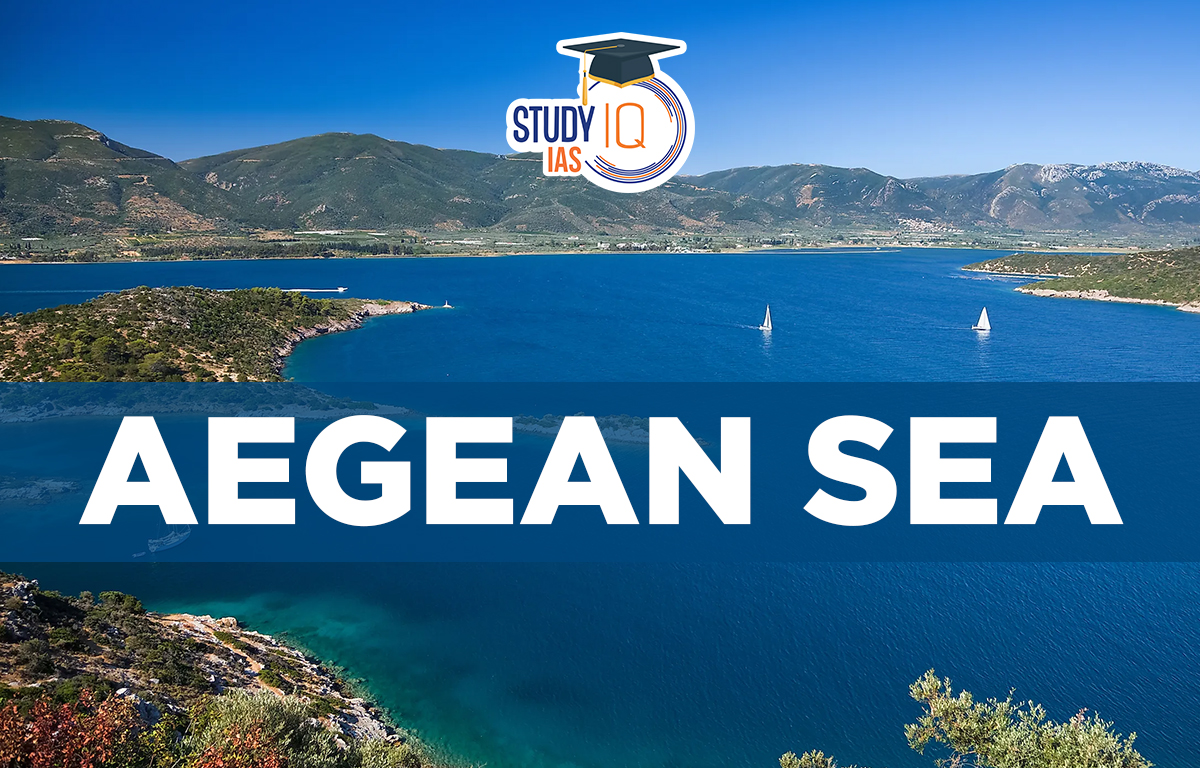Table of Contents
Aegean Sea
The Aegean Sea is named after Aegeus, whose son killed the Minotaur in Greek mythology. He was supposed to signal his father with a white flag to show he had won, but he forgot, leaving a black flag raised. Thinking his son had been defeated, Aegeus threw himself into the sea and died. The Aegean Sea is a part of Mediterranean Sea and lies between Greece and Turkey. The Aegean Sea is connected to the Black Sea via the straits of the Dardanelles, the Sea of Marmara, and the Bosporus, with the island of Crete marking its southern boundary.
Read More: Dead Sea
Aegean Sea Bordering Countries
The Aegean Sea is bordered by two countries namely Greece in the west and north and Turkey on the eastern side. The region was home to two great ancient civilizations: Crete and Greece.
Read More: Adriatic Sea
Aegean Sea Archipelago
The Aegean Sea was known as the archipelago in ancient times. Here are the important points about the Aegean Sea archipelago:
- Crete: Largest island, rich history, beautiful landscapes
- Rhodes: Ancient ruins, stunning beaches
- Santorini: Dramatic views, white-washed buildings, sunsets
- Mykonos: Vibrant nightlife, beautiful beaches
- Naxos: Largest Cyclades island, lush landscapes, ancient sites
- Paros: Charming villages, excellent beaches
- Samos: Lush greenery, ancient history
The islands offer a mix of cultural experiences, stunning scenery, and outdoor activities. The Aegean Sea is known for its clear waters and rich marine life.
Read More: Sea of Okhotsk
Aegean Sea Islands
The Aegean Islands are grouped into several categories, including the Dodecanese, Cyclades, Sporades, Saronic Islands, and North Aegean Islands, along with Crete and its nearby islands.
- The Dodecanese, in the southeast, includes islands like Rhodes, Kos, and Patmos.
- The Cyclades, in the south, feature islands such as Delos and Naxos.
- Lesbos is located in the North Aegean Sea.
- Euboea, Greece’s second-largest island, is also in the Aegean, although it’s managed as part of Central Greece.
Nine of Greece’s twelve administrative regions border the sea, as do the Turkish provinces of Edirne, Canakkale, Balkesir, Izmir, Aydn, and Mula to the east. Imbros, Tenedos, Cunda Island, and the Foça Islands are among the Turkish sea islands.
Read More: Sea of Japan
Aegean Sea Treaty
During the Balkan Wars of 1912-13, Greece absorbed the Ottoman Empire’s islands of Limnos, Samothrace, Lesvos, Samos, Chios, and Ikaria. The Treaty of Lausanne of 1923 granted it official sovereignty over them. Another treaty made in London in 1914 stated that Greece could only have the islands if they were demilitarized, meaning no military forces could be there. Turkey believes that the Lausanne Treaty refers to this 1914 treaty and has the same conditions. However, Greece disagrees with that view.
Read More: Sea of Azov
Aegean Sea Dispute
The Aegean Sea has been a source of political tensions between Greece and Turkey, particularly with regard to disputes over the delimitation of their territorial waters and exclusive economic zones. Turkey says Greece is building a military presence on the Aegean islands, which should be unarmed according to treaties. Turkey believes the islands were given to Greece with the condition that they stay demilitarized. Greece disagrees, saying Turkey is misinterpreting the treaties. Turkey claims it has the right to defend itself, especially if Greece extends its territorial waters. Right now, Greek-Turkish disputes are mainly about water issues rather than land.
They currently share six nautical miles (11 kilometres) of Aegean territorial water. The United Nations Convention on the Law of the Sea (UNCLOS), signed in 1982 and ratified by 158 countries, states that states may claim up to 12 nautical miles (about 20km).
Read More: Caribbean Sea
Aegean Sea Significance
Access to the sea allowed Ancient Greece to expand economically. Because being on the sea allows for the construction of numerous ports for trade. The Greeks also became skilled navigators, allowing them to trade with other city-states. The ancient Greeks used to travel from city to city across the Aegean Sea. The Aegean Sea has a rich cultural and historical heritage, as it was the centre of several ancient civilizations such as the Minoans and Mycenaeans. The Aegean Sea is home to a diverse range of flora and fauna, and it also serves as a important habitat for several species of migratory birds.
Read More: Atlantic Ocean


 Indus Valley Civilization, History, Phas...
Indus Valley Civilization, History, Phas...
 Summer Solstice, Definition, Reason and ...
Summer Solstice, Definition, Reason and ...
 Bihar Caste Census Report 2023, Caste Wi...
Bihar Caste Census Report 2023, Caste Wi...





















